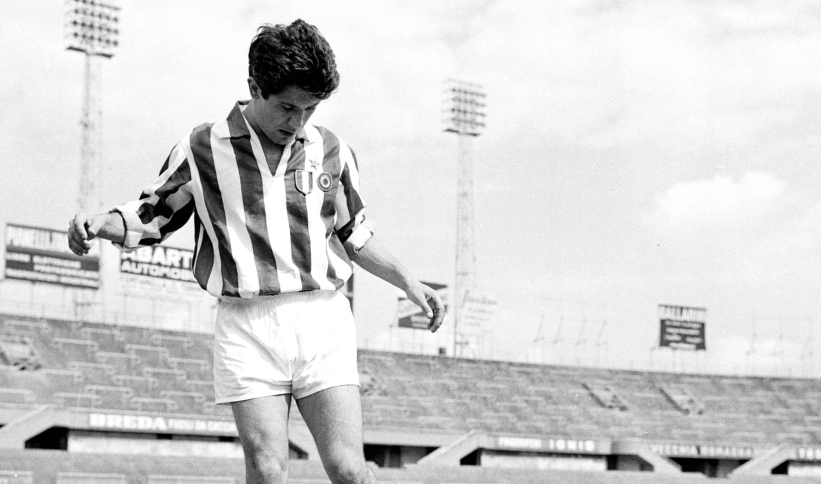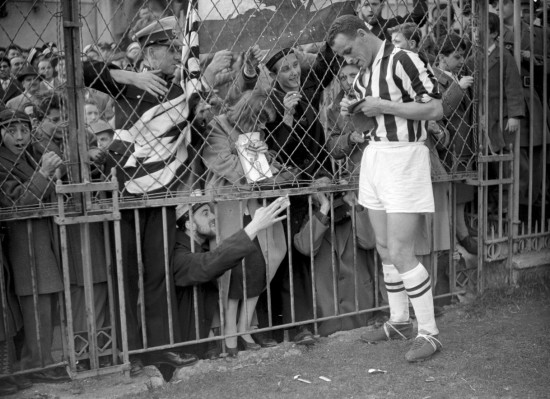Juventus have been blessed with sublime foreign players throughout the 20th Century – Zbigniew Boniek, Didier Deschamps, Luis Del Sol, Raimundo Orsi, Luis Monti, Michel Platini and Zinedine Zidane to name but a few. Yet few have had a greater impact on the club and its fans than John Charles.
Born in Swansea on the 27th December 1931, the Welshman’s football career began in the youth team of his home town. Standing at an imposing 6ft 2in, it was obvious Charles had the physique to succeed and it did not take long for the youngster to spread his wings. Discovered by Leeds United while playing youth football, Charles signed for the Yorkshire club in late 1948 after impressing them on trial.
Initially starting for the reserves, he was employed in several positions, from right-back and centre-back to the left of midfield. In spite of the chopping and changing, Charles took everything in his stride and it took just seven months for the Welshman to make his debut for the first team. He made his league debut in April 1949 at centre-back yet the following year he would spend two years away on national service.
After returning to Leeds in late 1951, manager Frank Buckley — who played a vital role in the Welshman’s development — decided to switch Charles to centre-forward and his decision was vindicated in the 1952-53 season. The defender turned forward used his physicality, strength and aerial prowess to good effect and by the end of the season, the Welshman had scored 26 goals in the Second Division.
Now permanently situated upfront, Charles went from strength to strength. His 30 goals in 41 games during the 1955-56 season helped promote Leeds to the First Division. Just like Paolo Rossi with Vicenza over 20 years later, promotion to the top flight would serve to take Charles’ performances to a new level. His 38 goals in 40 games made him the league’s top scorer and guided Leeds to a respectable eighth place finish in their first season back in the English top flight.
Those Herculean efforts soon attracted the attention of Juventus. With the help of Gigi Peronace, the first real agent in England, the Bianconeri signed Charles for £65,000 and the Welshman pocketed a £10,000 signing on fee. Juventus’ owners, the Agnelli family, had spent lavishly that summer, also recruiting Omar Sivori from River Plate. Juventus had good reason to open the purse strings. They finished ninth in the 1956-57 Serie A season and were just three points above the relegation zone. The Agnellis knew investment was needed to improve a faltering team hence the recruitment of Sivori and Charles.

Omar Sivori and Juventus: Leading the ‘Trio of Death’
The Welshman soon justified his sizeable fee. Under the management of Serbian Ljubiša Broćić, Charles was employed in the middle of a front three, with the creativity of Sivori and wily captain Giampiero Boniperti on the wings. They wreaked havoc on Serie A defences during the 1957-58 season and Charles was Juve’s standard bearer. The Welshman’s directness and power in the air was complemented by Sivori’s artistry and Boniperti’s high footballing IQ, much like a finely tuned orchestra.
The Bianconeri finished Serie A champions by a margin of eight points – their first league title in six years. At the forefront of their success was Charles, who in his first season netted 28 goals, becoming Capocannoniere. It did not take long for Juventus’ front three to become idolised by fans and they became known as The Holy Trident.
Juventus limped to fourth in the 1958-59 season but Charles did not fall victim to second season syndrome,, scoring 23 goals in the league and helping the Bianconeri win the Coppa Italia. Once again, the Welshman displayed his talents to devastating effect in the 1959-60 season, as he played a key part in helping Juventus reclaim the Scudetto and Coppa Italia. Both Charles and Sivori tore holes through the defences of Serie A, as Charles scored 23 goals and Sivori finished Capocannoniere with 28. Only four of the other 17 teams in the league would score more than Charles and Sivori combined that season.
However, though Charles’ would win his third league title for Juventus in the 1960-61 season, the Welshman’s performances gradually plateaued. His 15 league goals was largely overshadowed by Sivori, who won the Ballon D’or in 1961. Ultimately, the 1961-62 campaign would be Charles’ final season at the Bianconeri. The rough and tumble of Serie A was taking its toll as injuries curtailed Charles’ playing time. He made just 21 league appearances that season, scoring eight goals. The team as a whole also struggled, finishing in a lowly 13th place. Off the field, Charles was having to contend with personal problems too, most notably the end of his marriage.
Despite these troubles, Charles was still able to showcase his capabilities in his final season, showing that form is temporary but class is permanent. A fine example was in the 1961-62 European Cup. It had been a competition in which the Bianconeri had faltered when pitted against Europe’s best. In Charles’ first experience of the competition in 1958-59, Juve had fallen in the preliminary round against Wiener Sport-Club of Austria. They lost 8-3 on aggregate – losing the second leg by an embarrassing 7-0 margin in Vienna. Once again, Juventus fell again in the preliminary round of the 1960-61 edition, losing to CDNA Sofia of Bulgaria.
For John Charles, it was third time lucky in Europe, however, as Juve managed to reach the quarter finals of the 1961-62 edition. Their opponents were Real Madrid – serial winners of the competition who had won it five times out of the last six years. Juventus would lose the first leg 1-0 in Turin – with the second leg to be played a week later at the Santiago Bernabeu, where Real Madrid had never lost a European Cup fixture.
Playing on the right of midfield, Charles put in a barnstorming performance, causing Real Madrid’s defence all sorts of problems. With six minutes of the first half to go, the Welshman fashioned Juventus’ opener. A cross from the left came towards Charles whose cushioned header set free Sivori, who guided the ball past José Araquistáin. With the scores tied after two legs, a third game was played at a neutral venue in Paris a week later, where Real Madrid would eventually beat Juventus 3-1. Charles’ European exploits would be the high point of his final season with Juve, and the Italians later sold him back to Leeds in the summer 1962.
Nevertheless, the Welshman’s impact at the club was such that Juve fans nicknamed him II Gigante Buono – The Gentle Giant. Charles was never booked during his five year stay in Turin, which was an achievement in itself due to the ruggedness of Serie A defenders. The shirt pulling, grappling and tough-tackling would have provoked many players into retaliation, but not Charles. He played football how it was supposed to be played – he didn’t indulge in the dark arts, instead using his talent to bring joy to others.
The Welshman reaped the rewards and his statistics at Juventus were simply outstanding – 108 goals in 155 matches, three Serie A titles and one Coppa Italia. Charles’ legendary status was later cemented when fans voted him the best foreign player in the club’s history during Juve’s centenary celebrations.
John Charles is sadly no longer with us, passing away in 2004 at the age of 72, but his memory will live forever in the history of Juventus football club.
Words by Yousef Teclab: @yousef_teclab

